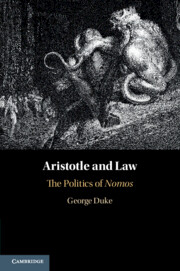Book contents
- Aristotle and Law
- Aristotle and Law
- Copyright page
- Dedication
- Epigraph
- Contents
- Acknowledgements
- Note on the Text
- Abbreviations
- Introduction
- 1 Law As Rational Constraint
- 2 The Legislator
- 3 The Constitutional Relativity of Law
- 4 The Common Advantage and Political Justice
- 5 Stability and Obedience
- 6 Natural Justice and Natural Law
- 7 Equity and the Spoudaios
- Conclusion
- References
- Index
1 - Law As Rational Constraint
Published online by Cambridge University Press: 28 November 2019
- Aristotle and Law
- Aristotle and Law
- Copyright page
- Dedication
- Epigraph
- Contents
- Acknowledgements
- Note on the Text
- Abbreviations
- Introduction
- 1 Law As Rational Constraint
- 2 The Legislator
- 3 The Constitutional Relativity of Law
- 4 The Common Advantage and Political Justice
- 5 Stability and Obedience
- 6 Natural Justice and Natural Law
- 7 Equity and the Spoudaios
- Conclusion
- References
- Index
Summary
In this opening chapter I closely examine Aristotle’s discussions of the topic of nomos in Nicomachean Ethics X.9 and Politics III.15-16. These passages contain famous statements which associate law with rationality, the promotion of virtue, universality and impartiality. A selective reading of these statements can suggest that law is strictly identifiable with reason. As a corrective to such a one-sided intellectualist reading, I seek to place the rationalism of Aristotelian nomos in its broader political context. This requires engagement with Aristotle’s acknowledgment of the law’s necessary use of constraint over resistant passions in its attempt to guide citizens towards virtue. While Aristotle undoubtedly regards good law as both an achievement of the architectonic legislator’s practical reason and as rational in its content, its effective political application does not presuppose that the majority of citizens grasp the reasons for its directives. Aristotle’s conception of nomos thus resists easy assimilation to the intellectualist view that a political community’s laws are a set of reasons for action directed to autonomous rational agents. Section 1 sets the scene by considering the major passages which have led many interpreters to propose readings of Aristotelian nomos with an intellectualist slant. In section 2, I examine the terms of Aristotle’s informal definition of law in X.9 of the Nicomachean Ethics. Section 3 then situates this definition in the broader frame of X.9 in order to demonstrate the role of nomos as a constraint on desire and the implications of this for the ideal of the rule of law. Finally, section 4 discusses educational laws as a privileged example of the interplay of reason and compulsion in the political applications of nomos.
Information
- Type
- Chapter
- Information
- Aristotle and LawThe Politics of <I>Nomos</I>, pp. 17 - 39Publisher: Cambridge University PressPrint publication year: 2019
